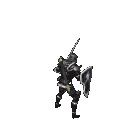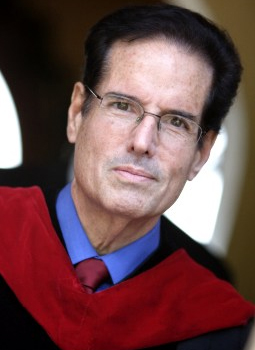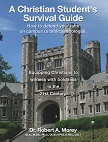Is the Qur'an the Word of God?Dr. Robert A. Morey
Click here to get the digital download version of this article.
When you pick up a copy of the Qur'an, several questions should immediately come to your mind:
These questions are good and necessary. But how can we find answers to them? There are two different approaches to answering these questions
Part I: The Muslim Approach
The Hadith is sometimes called the second inspiration with the Qur'an being the first inspiration. The Hadith claims to be the record of Muhammad's exposition and application of the Qur'an, biographical material on Muhammad, and the history of the writing, collection, and composition of the text of the Qur'an. (Bukhari vol. VI, no. 564). The authority and authenticity of the Qur'an depends entirely upon the integrity and teachings of the Hadith. In other words, the Qur'an is valid only if the Hadith is true. If it is false, then the Qur'an is automatically false.
A. The Integrity of Muhammad The integrity of Muhammad is all important. He was either whom he claimed to be, a liar or a nut case (mentally insane or demon possessed). This is why the Traditions went to such great lengths to create a model of Muhammad that depicts him as a "super man" as well as a prophet. What do we find in the Hadith?
1. Muhammad's credentials for prophethood are unacceptable. The two prominent Hadithic "proofs" of his prophethood came from pagan ideas of what a shaman would look like and the manner in which he would be inspired.
2. He failed a direct test of his claim to prophethood. He was asked to explain why a child will look like one parent as opposed to looking like the other. He claimed that Gabriel came and gave the inspired answer. See Bukhari vol. IV: no. 546. So, we are dealing with revelation and not just his personal opinion. He said that the child will look like which parent reaches his or her sexual climax first. The study of genetics and DNA forever disproves this idea.
3. He believed in magic, the evil eye, amulets, omens, spells, etc. He was superstitious about many things and made up weird rules about bathroom duties (Bukhari vol. 1, no. 144; vol. IV, nos. 110, 111; vol. VII, nos. 636, 648, 649, 650; Muslim vol. I, no. 458; vol. III, 3 nos. 5424, 5427). He was afraid whenever a strong wind blew (Bukhari vol. II, no. 144) and of eclipses (Bukhari vol. II, no. 167).
While this is bad enough, the Hadith tells us that Muhammad was at times under magical spells, i.e., bewitched, and told lies and did things while under those spells. (Bukhari vol. IV, nos. 400, 490; VII, no. 660; Muslim vol. III, no. 5428) Once it is admitted that he told lies and did things while under satanic influence, then the entire Qur'an could be satanic in origin. Later Muslim authorities even went so far as to say that he was at one time inspired by Satan to put some verses into the Qur'an. They were later removed because they were Satanic verses. (Surah 53:19, 20)
4. The Hadith tells us that "Allah made the prophet wealthy through conquests." (Bukhari III: no. 495), Was he in it for the money? Some Muslims are ignorant of this Hadith and claim that Muhammad was poor like Jesus.
5. He did not keep the rules he imposed upon others. He had more wives than four (Bukhari vol. I, no. 268) and did not write a will (Bukhari vol. IV, nos. 3, 4).
6. He commanded that anyone who fell away from Islam should be murdered. (Bukhari vol IV, no. 260; vol. V, no. 630) Volume IX is filled with death threats against apostasy (pgs. 10, 11, 26, 34, 45, 50, 57, 341, 342). These Hadiths contradict other Hadiths which say that no one ever leaves Islam (Bukhari vol. I, nos. 6, 48).
The punishment of apostates reveals that he did not believe in the freedom of religion, the freedom of speech, the freedom of assembly and the freedom of the press. The fact that he commanded that no churches or synagogues be allowed in Arabia is a telling argument that he was not a man of peace.
7. The Hadith reveals that Muhammad had to ask forgiveness for sin more than seventy times a day. (Bukhari vol. I, nos. 711; 78; vol. V, no. 724) Since Muslims believe that prophets must be sinless, this means that Muhammad was not a prophet.
8. He was guilty of false prophecies. 1 - The 100 yr. Prophecy. (Bukhari vol. I, no. 539)
9. He kissed and caressed the idol of black stone set into the wall of the Kabah. (Muslim vol. II, no. 2912, 2916) We cannot imagine Abraham or Jesus kissing a pagan idol and then commanding their followers to do so.
10. While Muslims claim that Muhammad was illiterate in order to make the Qur'an a miracle, the Hadith records that he could in fact read and write. (Bukhari vol. IV, no. 393)
II. The Teachings of Muhammad Just as the Hadith gives us good reasons to question the integrity of Muhammad, his teachings recorded in the Hadith give us even more reason to doubt he was a prophet. The following is a brief list of some of the strange and absurd teachings of Muhammad.
1. Adam was 60 cubits tall! (Bukhari vol. IV, no. 543) Then how tall was Eve? If they were that tall, how did we get here? Is it medically possible for him to be that tall?
2. Muhammad was a dog hater. He thought that angels could not enter a house if a dog was there and that black dogs were devils. Thus he ordered dogs to be killed and forbid the selling of dogs. (Bukhari vol- IV, nos. 539, 540; Muslim vol. I, nos. 551, 552; vol. II, nos. 3803, 3829)
3. Satan lives in the nose over night. He can be flushed out if you snort water up and then out the nose. (Bukhari vol. IV, no. 516; Muslim vol. I, no. 462) How big is Satan? Is he in everyone's nose? Is he omnipresent?
4. Muhammad forbade the game of chess! (Muslim vol. IV, no. 5612) This makes no sense to me.
5. People turn into rats, pigs and monkeys. (Bukhari vol. IV, nos. 524, 627; Muslim vol. IV, no. 7135). Abraham's father was turned into an animal (Bukhari vol. IV, no.569)
6. Muslims have one intestine while non-Muslims have seven! (Muslim vol. 111, no. 5113-5115)
7. If you lift up your eyes towards heaven while praying, your eyes will be snatched out! (Muslim vol. III, nos. 862-863)
8. One wing of a fly has poison but the other wing has the antidote to it. (Bukhari vol. IV, no. 537)
9. We should drink camel urine as a medicine. (Bukhari vol. I, no. 234)
10. Fevers are from the fire of hell and can be cooled by water. (Bukhari vol. IV, nos. 483, 486)
III. The Text of the Qur'an Who wrote out the Qur'an? On what materials? Who put the Qur'an together? Where did he find the materials to do this? Why did he do this? Were others putting together their own Qur'ans? Did these Qur'ans contradict each other? How did one text gain dominance over all the others? What happened to the other Qur'ans? Only the Hadith gives us answers to these questions.
1. From Bukhari vol. VI, no. 509 we learn the following things:
2. Even after the manuscript was put together, they found that they had missed some verses (Bukhari vol. IV, no. 62, no. 510).
3. They tried to burn all the other Qur'anic fragments and manuscripts. (VI, no. 510)
4. Uthman is usually credited for making the present text. (vol. I, no. 63; vol. IV, no. 709; vol. VI, nos. 507, 510) It is clear that the text of the Qur'an was not perfect and that conflicts arose which made it necessary to make one uniform text. That Uthman tried to burn all the other Qur'ans is clear.
Yet, there are thousands of variant readings and there remains controversies about verses such as the one about stoning which were omitted by mistake.
IV. The Contradictions and Variant Readings in the Hadith One problem all Muslims face is that there are contradictions in the Hadith, conflicting readings and abrogations of Hadiths (Bukhari vol. I, nos. 42, 47, 74, 78, 80, 81, 86, 102, 107, 112, 159 vs 160, 161, 179, 180; vol. III, nos., 159, 161; Muslim vol. I, nos. 682, 685, 689, 699; vol. II, nos. 2547, 2548). The footnote on Bukhari vol. III, no. 159 says, "Hadith no. 159 contradicts the Hadith of Al-Hassan." Evidently Allah was not capable of preserving a perfect text of the Hadith. On what grounds then can we assume that the Qur'an was kept perfect?
V. The Inspiration of the Qur'an The mistakes in the Qur'an are well known. I list over one hundred such problems in Islamic Invasion. The following is a few of the more glaring problems that the average person has no problem seeing. All we need is ONE factual error to disprove the Qur'an. We are not talking about conflicts with theories but with brute facts.
1. Theological errors: The Qur'an is mistaken about what Christians and Jews believe. (Surah 5:73, 75; 9:30).
2. Historical mistakes: the Samaritans (Surah 20:85, 97), Alexander the Great, etc.
3. Grammatical errors: Arabic scholars point out errors in Surahs 2:177, 192; 3:59; 4:162; 5:69; 7:160; 13:28; 20:66; 63:10, etc.
4. Linguistical errors: Even though the Qur'an claims to be in pure Arabic (12:2; 13:37; 16:105; 4l: 44; 42:7), it has foreign words.
5. Scientific errors: sun in muddy pond (Surah 18:86), mountains never shake (Surah 16:15; 21:31; 31: 10; 78:6, 7; 88:19)
6. Moral errors: Muhammad justifying the taking of his daughter-in-law (Surah 33:36, 38)
7. Mathematical errors: Did creation take six days (Surahs 7:51; 10:3) or eight days (Surah 41:9, 10, 12)?
8. Chronological errors: Puts Muslim vocabulary into mouth of Patriarch, prophets, etc. (Surah 2:129133; 7:124,126, etc.). The words did not exist in Hebrew or Arabic at that time.
9. Biblical errors: The convolution of names, places, events and times. Couldn't even get the name of Jesus right. He was the Son of God who died for our sins on the cross according to the Bible. The Qur'an contradicts this.
10. Political errors; Commands Jihad -- against apostates and non-Muslims (Surah 4:91; 5:33; 9:5)
Conclusion The Hadith and the Qur'an stand or fall together. The facts are clear that they are not from God and are false works.
Part II The Secular Approach
Modern scholars such as Crook, Crone, Wansbrough, Rippin, etc. are giving us a totally different model of the origins of Islam and the Qur'an. Once you put aside the Qur'an and the Hadith, you begin to see that Islam created the Qur'an instead of the Qur'an creating Islam. Islam created a mythological Muhammad who is nothing like the historical Muhammad, if that was his true name. The Qur'an had multiple authors from various locations who combined different legends and materials to make the stories found in it. It took 150-200 years for the Qur'an to appear. Muhammad never saw the present Qur'an and would disown it if shown it. He is not the source of it. This explains the contradictions and mistakes in it.
1. No references to Muhammad as a prophet have been found in contemporary literature, rock inscriptions or coins.
2. No manuscripts of the Qur'an exist before 150-200 years after Muhammad. This allows opportunity for myths and legends to arise.
3. The claim that Uthman compiled the Qur'an has no evidence to support it.
4. The claim that two "original" Uthman Qur'ans can be seen at Topkapi, Turkey and in Tashkent, Russia is false. The manuscripts are in the Kufic script which did not exist in the 7th Century. They are clearly from the 9th Century and are in "landscape" format which was not used in the 7th century.
5. The present text of Qur'an came from multiple authors using erroneous legends, myths, and stories. It has many additions, deletions, variant readings, and no primary source materials to support it. It is thus a corrupt text and cannot be trusted to tell us what Muhammad really taught or did.
6. The text and stories of the Hadith are as corrupt as the Qur'an. Where is the evidence to support its claims? |






































